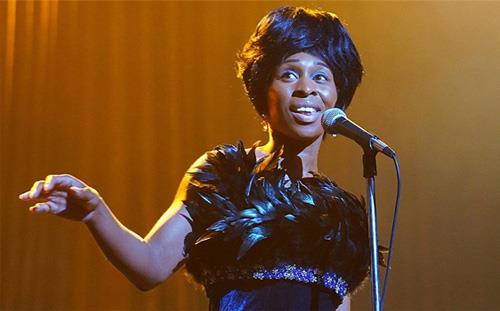
Some lives are neat and fun-sized; they can easily be condensed into a movie or less.
Then there are the grand exceptions: Genius: Aretha, a four-night, eight-hour miniseries (that started Sunday, 3/21 but continues with reruns of the early episodes at various times followed by that evening's episode) will spotlight the overflowing life of the late Aretha Franklin.
"Aretha had such . . . a long career," writer-producer Suzan-Lori Parks told the Television Critics Association (TCA). She had "a beautiful life, full of peaks and valleys that we can only imagine living."
Now that life is a miniseries that's beautifully crafted – with one flaw: Too often – especially in the early hours – Franklin is somewhere between stoic and stony; she's simply someone things happen to.
Gradually – very gradually – that changes. But even during the slow parts, the music saves the day.
Franklin's music, like the rest of her life, ranged afar. She went from gospel to jazz, then was dubbed "the queen of soul." She rocked; she dabbled in disco. And when Luciano Pavarotti turned ill, she sang opera at the Grammys.
For Cynthia Erivo, portraying her required adjustments. "It's relearning how to use my voice in a completely different way," she said.
The rest of Franklin's life involved similar range. She was 9 when her mother left, 12 when her mother died of a heart attack, 12 when she gave birth to her first son, and 15 when she had her second.
"She could have collapsed," said Courtney B. Vance, who plays her father. "But she rose above it."
Eventually, she became a potent force and a civil rights activist, Parks said. "She worked with Dr. King when it was, perhaps, less than fashionable . . .. She also aligned herself with Angela Davis when that wasn't really a cool thing to do."
It's a large life – the third one profiled under the Genius banner used by National Geographic and producers Brian Grazer and Ron Howard. The fourth will be Martin Luther King Jr.
The first Genius projects – Albert Einstein in 2017 and Pablo Picasso in 2018 – were lushly crafted and widely praised. They totaled 18 Emmy nominations, including nominations for best miniseries.
They also fit the stereotype of genius – white, male, European. The third was planned for Mary Shelley (the Frankenstein author), but the story didn't gel. Then came the switch to Franklin.
The double load – writing it and being the showrunner – went to Parks, who is a Pulitzer Prize-winning playwright, a screenwriter (including the current United States vs. Billie Holiday), and a novelist.
"I had conversations with Aretha Franklin years ago," Parks said, "when she was considering doing a stage musical about her life. I still have her voice in my head."
The title role went to Erivo, 34, a Tony-winner for the Color Purple revival.
The daughter of Nigerian natives, Erivo grew up in England, far from Franklin's Detroit roots. "I love Aretha," she said. "I've been listening to her since I was little; I learned to sing by listening to her."
Raphael Saadiq, the project's music director, had similar influences. "I'm a huge fan of all of Detroit's music," he said. And as a kid in Oakland, Cal., he recalls, "growing up in my house with James Cleveland and the Rev. C.L. Franklin; I grew up listening to those records."
Yes, C.L. Franklin (Aretha's father) was so famous that some of his sermons were sold as records; one is in the National Recording Registry. He was in Memphis when Aretha was born, moved to Buffalo when she was 2, and to a giant Detroit church when she was 4. He also did the summer gospel circuit, which included music by Cleveland, other music stars, and young Aretha.
He was an epic figure and, by various accounts, an overbearing one – given to excess in alcohol, sex (impregnating a 12-year-old parishioner), and more.
The family had troubles, Vance said, but "the thing that's constant is the music, the church music."
That's where Aretha started before mastering jazz, pop, soul, rock, and more, including the human condition. "She's not just the awesome sister who sings brilliantly and plays piano gorgeously," Parks said. "She also brings people together."
Rushing toward a Memorial Day airdate, the project had three episodes to shoot when the COVID shutdown began. "We were so exhausted," director Anthony Hemingway said. "It gave us a break."
Now, ten months later than expected, Aretha finally has its genius spotlight.
For info on airtimes of Genius: Aretha, please check your listings or the National Geographic schedule.